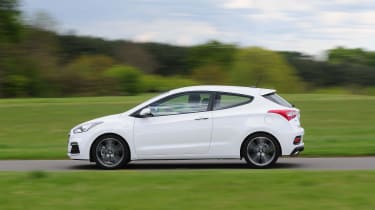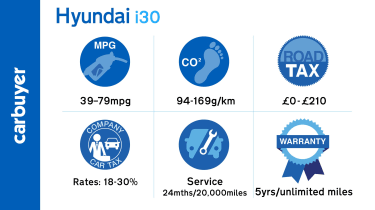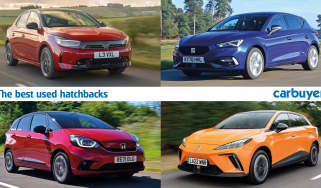Hyundai i30 hatchback (2011-2016) - MPG, running costs & CO2
Engines are reasonably efficient, but the Hyundai i30 has to give second-best to some more economy-minded rivals for ultimate efficiency
Hyundai offers a well rounded range of engines in the i30, focusing on tax-exempt diesels that’ll prove popular with fleet buyers. However, although they’re all quite efficient, comparable engines in rival such as the VW Golf BlueMotion or Ford Focus ECOnetic beat the i30 in terms of outright fuel economy.
Hyundai i30 MPG & CO2
If you’re after the lowest running costs possible, then the entry-level, 109bhp 1.6-litre diesel engine will probably be the most appealing option for you. It’s the only engine in the i30 range that’s exempt from road tax if registered before April 2017 (but thanks to their low emissions, the rest of the diesels don’t cost more than £20 a year) and its claimed fuel economy of 78mpg is quite impressive.
However, those figures do plummet a bit when the optional seven-speed automatic gearbox is fitted (all models come with a six-speed manual as standard): road tax rises to £20 and fuel economy is a less impressive 67mpg.
Those figures are very good in isolation, but they do pale in comparison with what rivals can manage. A Volkswagen Golf BlueMotion is also tax-exempt and can return a claimed 88mpg, whereas the Ford Focus ECOnetic isn’t too far behind with a claimed 83mpg.
More reviews
A similar story can be told for the Hyundai i30's petrol engines – although the 100 and 120bhp engines can return 48mpg and 44mpg respectively (fitting the six-speed automatic to the latter brings it down to 41mpg), they’re outclassed by more powerful and less thirsty like-for-like engines in rival cars. Road tax is pretty high, too – even the cheapest petrol will set you back £135 a year if registered before April 2017.
Insurance group
The Hyundai i30 ranges from insurance group seven to 13, so premiums should be competitive – conventional versions of the VW Golf and Ford Focus range from group seven to group 19, while the Mazda3 starts off from group 13.
Servicing
The service interval for every Hyundai i30 is 20,000 miles. That looks generous when compared to the likes of the Ford Focus and Mazda3, which need a dealer check-up every 12,500 miles. This also makes it easier to budget for maintenance with the i30 than with a VW Golf, which has a variable service schedule – the service indicator tells you when a check-up is required.
As with many rivals, Hyundai offers a pre-paid servicing package, with prices varying according to whether you choose a petrol or diesel. A three-year/30,000-mile plan costs £350 for petrol cars and £450 for diesels, while five-year/50,000-mile packages are priced at £650 and £750 respectively.
Warranty
Hyundai and sister company Kia have really shaken up the market with their industry-leading warranties. And while the seven-year/100,000-mile deal served up by Kia grabs lots of headlines, the Hyundai package is arguably more tempting. It provides a fully transferable, unlimited-mileage manufacturer guarantee on its cars for five years. It’s part of the Triple Care scheme, which also comprises five years’ RAC breakdown cover and five years of free annual health checks at your Hyundai dealer.
Not only is the warranty better than the standard three-year/60,000-mile cover included with the VW Golf, Ford Focus, SEAT Leon and Mazda3, but these cars don’t come close to matching Hyundai’s breakdown cover, either.














